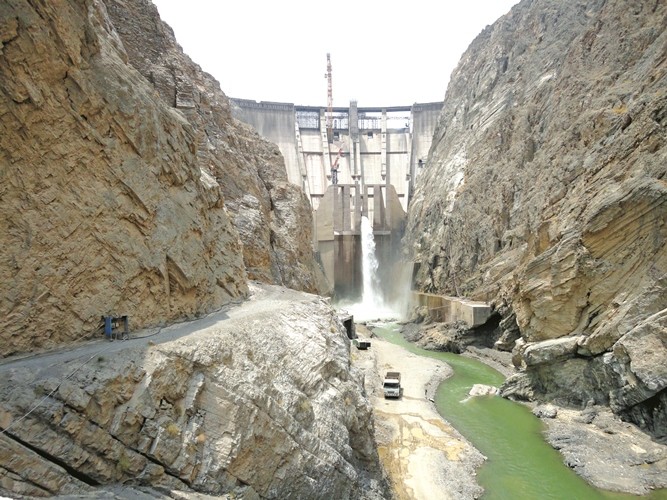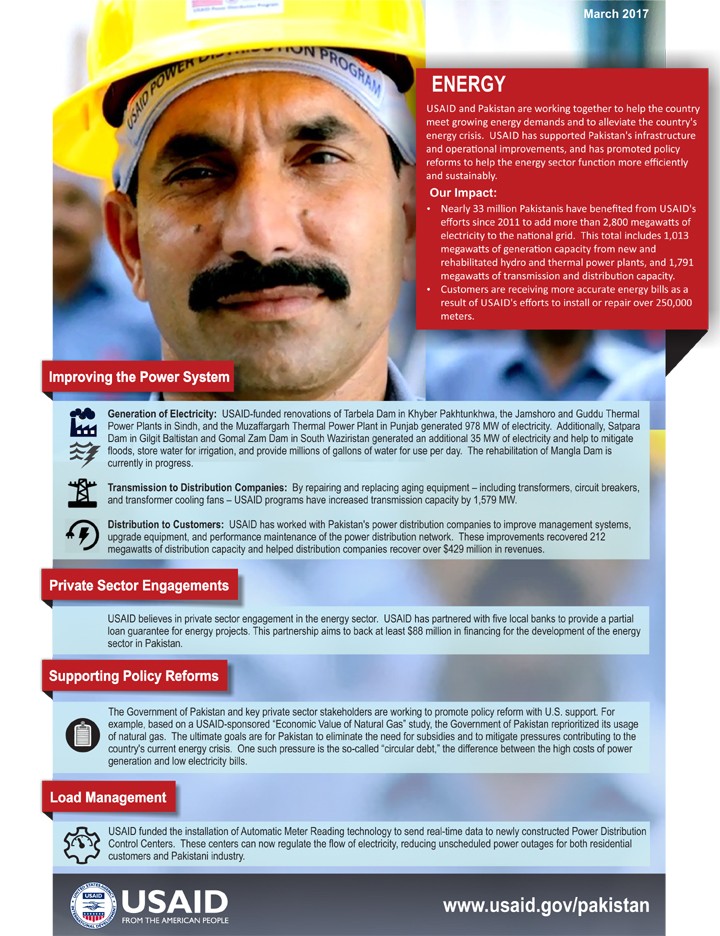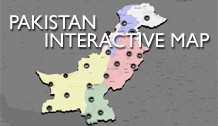
Gomal Zam dam located in South Waziristan Agency of Federally Administered Tribal Areas, Pakistan.
USAID Pakistan
USAID and Pakistan are working together to help Pakistan meet Pakistan’s growing energy demands and to alleviate the country's energy crisis. USAID has supported infrastructure and operational improvements, and promoted policy reforms to help the energy sector function more efficiently and sustainably.
OUR IMPACT
- Nearly 33 million Pakistanis have benefited from USAID’s efforts since 2011 to add more than 2,800 megawatts of electricity to the national grid. This total includes 1,013 megawatts from new or rehabilitated dams and thermal power plants, and 1,791 megawatts from improvements in the transmission and distribution system.
- Customers are receiving more accurate energy bills as a result of USAID’s efforts to install or repair over 250,000 meters.
Improving the Power System
Generation of Electricity: USAID-funded renovations of Tarbela Dam in Khyber Pakhtunkhwa, the Jamshoro and Guddu Thermal Power Plants in Sindh, and the Muzaffargarh Thermal Power Plant in Punjab generated 978 MW of electricity. Additionally, Satpara Dam in Gilgit Baltistan and Gomal Zam Dam in South Waziristan generated an additional 35 MW of electricity and help to mitigate floods, store water for irrigation, and provide millions of gallons of water for use per day. The rehabilitation of Mangla Dam is currently in progress.
Transmission to Distribution Companies: By repairing and replacing aging equipment – including transformers, circuit breakers, and transformer cooling fans – USAID programs have increased transmission capacity by 1,791 MW.
Distribution to Customers: USAID worked with power distribution companies (DISCOs) to improve management systems, upgrade equipment, and maintain the distribution network. DISCO improvements recovered 212 megawatts of electricity and saved over $429 million.
Private Sector Engagement
USAID believes in private sector engagement in the energy sector. USAID has partnered with five local banks to provide a partial loan guarantee for energy projects. This partnership aims to back at least $88 million in financing for the development of the energy sector in Pakistan.
Supporting Policy Reforms
The Government of Pakistan and key private sector stakeholders are working to promote policy reform with U.S. support. For example, based on a USAID-sponsored “Economic Value of Natural Gas” study, the Government of Pakistan reprioritized its usage of natural gas. The ultimate goals are for Pakistan to eliminate the need for subsidies and to mitigate pressures contributing to the country's current energy crisis. One such pressure is the so-called “circular debt,” the difference between the high costs of power generation and low electricity bills.
Load Management
USAID funded the installation of Automatic Meter Reading technology to send real-time data to newly constructed Power Distribution Control Centers. These centers can now regulate the flow of electricity, reducing unscheduled power outages for both residential customers and Pakistani industry.
News

Energy Sector Fact Sheet [PDF, 1.2MB]









Comment
Make a general inquiry or suggest an improvement.